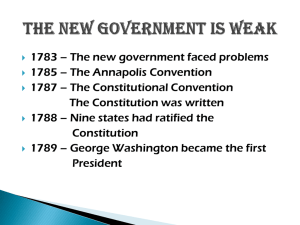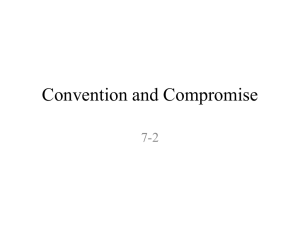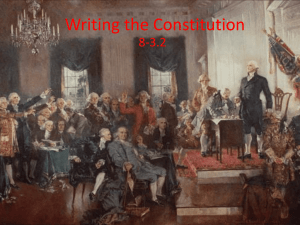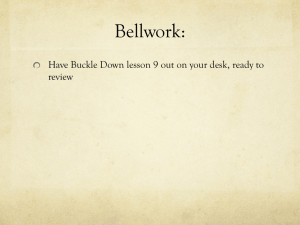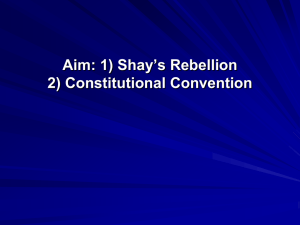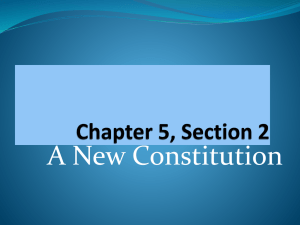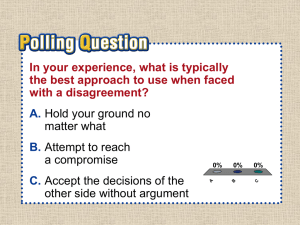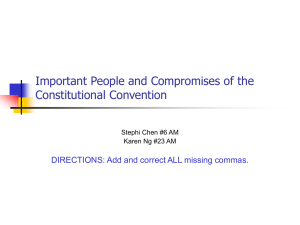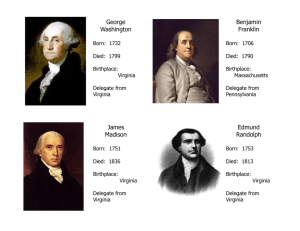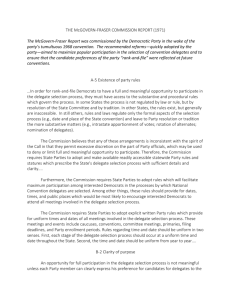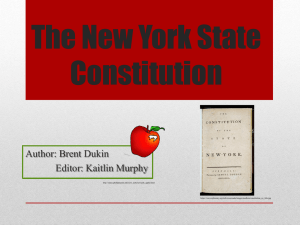Theme - Round 2
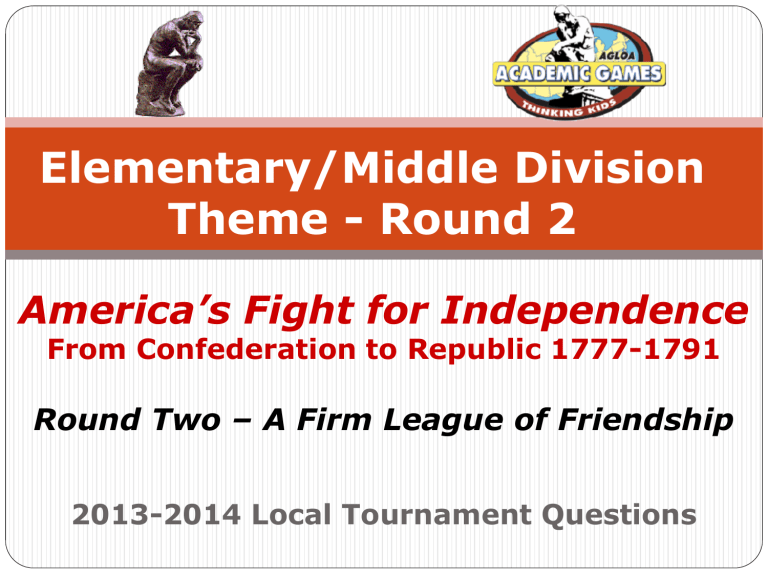
Elementary/Middle Division
Theme - Round 2
America’s Fight for Independence
From Confederation to Republic 1777-1791
Round Two – A Firm League of Friendship
2013-2014 Local Tournament Questions
TWO POINT QUESTIONS
1. The Constitutional Convention of 1787 resulted in the creation of the United States
Constitution. Which delegate was elected to preside over the Convention?
A. George Washington
B. James Madison
C. Alexander Hamilton
D. Benjamin Franklin
2. One of the preliminary government plans that was submitted was known as the Virginia
Plan. It proposed a very powerful bicameral legislature, with both houses determined proportionately. Who made these suggestions and is called the Father of the Constitution?
A. George Washington
B. Alexander Hamilton
C. Charles Pinckney
D. James Madison
3. One of the delegates to the
Constitutional Convention was a man with one leg. He was the writer of the Preamble to the Constitution. As a delegate to the
Convention, he gave 173 speeches at the
Convention, more than any other delegate.
Who was he?
A. Benjamin Franklin
B. George Mason
C. Gouverneur Morris
D. John Rutledge
4. Spending more time in Congress than any man of his time, this Framer of the
Constitution began as a farmer and a shoemaker. He then became a surveyor, shopkeeper, and an almanac publisher before passing the bar in 1754 and entering public office. Who was he?
A. William Churchill Houston
B. Elbridge Gerry
C. Roger Sherman
D. Robert Morris
5. Concerned that the Constitutional
Convention would work against them, one state not only boycotted the convention, but initially refused to ratify the Constitution.
Which state was it?
A. Pennsylvania
B. Delaware
C. Rhode Island
D. Massachusetts
6. In order to have enough power to act on a national level without infringing upon fundamental rights, the government was separated into three branches. To ensure that no single branch gained supremacy, a special system was instituted. This system was known as:
A. Full Faith and Credit
B. Checks and Balances
C. Equity and Security
D. Truth and Justice
FOUR POINT QUESTIONS
7. In 1215, this king was captured and forced to sign the Magna Carta (Latin, for Great Charter), which limited his power to tax, abuse, and even murder people at will. The drafters of our
Constitution had many influences in setting up the federal government in the Constitution, one of which was the Magna Carta. Who was this king who was forced to sign the Magna Carta?
A. King John
B. King James
C. King Richard III
D. King Henry VIII
8. The only two founders who helped to draft the Declaration of Independence, the
Articles of Confederation, and the
Constitution, were Benjamin Franklin and:
A. James Madison
B. Samuel Adams
C. Alexander Hamilton
D. Roger Sherman
9. Several states opposed the drastic changes that were proposed in the Virginia Plan. Who was the man chiefly responsible for the key details in the Virginia Plan?
A. John Blair
B. Edmund Randolph
C. James Madison, Jr.
D. George Mason
10. Many delegates disliked the Virginia Plan.
These delegates felt that the Articles needed only to be strengthened rather than overhauled, and that Congress should remain one body. Therefore, on June 15, 1787, the
New Jersey Plan was presented by a group of smaller states and was led by:
A. Jonathan Dayton
B. William C. Houston
C. William Paterson
D. William Livingston
11. Because of the hotly-debated issues about dividing Congress and assuring that each state had equal representation, three delegates decided to find some middle ground. They suggested that the “one state, one vote” rule could prevail in one house, while proportional representation would dictate membership in the other. What was this plan called?
A. The Massachusetts Compromise
B. The Connecticut Compromise
C. The Congressional Division
D. The Equitable Membership Rule
12. The issue of slavery had always been a sticking point when delegates to the convention were trying to determine how many representatives states would have under the new Constitution. After much debate about whether or not to include slaves as part of a state’s population, a settlement was reached, which was known as the:
A. Two-Thirds Compromise
B. One-Half Compromise
C. Three-Fifths Compromise
D. One-Quarter Compromise
SIX POINT QUESTIONS
13. Delegates from most of the Southern states wanted to allow the slave trade to continue. However, after weeks of arguing the matter they agreed to a prohibition of the trade that was set to begin in:
A. 5 years
B. 10 years
C. 20 years
D. 30 years
14. The Electoral College Compromise established a system for electing a president, whereby voters would vote for electors who would cast their ballots for candidates. Under this compromise, the number of electors allowed to each state would equal the total number of its
U. S. senators and U. S. representatives.
Accordingly, if a state has 29 representatives, how many electors will it have?
A. 29
B. 30
C. 31
D. 39
15. Delegate Madison believed that a direct link in a government between the executive branch and the judges led to corruption. Hence, he postulated a separate judicial branch. How was this judicial branch to be selected?
A. The President chose and the legislature confirmed the choice.
B. The legislature chose and the President confirmed the choice.
C. The states chose and the President confirmed the choice.
D. The legislature chose and the states confirmed the choice.
16. This delegate, nicknamed the Penman of the
Revolution, served in the Continental Congress for Pennsylvania, but he refused to vote for independence because he thought the colonies were not ready. He was a Quaker who had released all of his slaves by 1787. Who was this delegate?
A. George Read
B. Jacob Broom
C. John Dickinson
D. Richard Bassett
17. Although 70 delegates were appointed to the
1787 Constitutional Convention, only fifty-five were able or willing, to attend. Surprisingly, among those not present were some of the most prominent founding fathers, including John
Hancock, Patrick Henry, Thomas Jefferson, and:
A. Alexander Hamilton
B. John Adams
C. Benjamin Franklin
D. George Washington
18. On the issue of slavery, one Northern delegate stated, “It is inadmissible on every principle of honor and safety that the importation of slaves should be authorized to the states by this constitution.” This delegate was:
A. John Dickinson
B. James Wilson
C. Oliver Ellsworth
D. Roger Sherman

